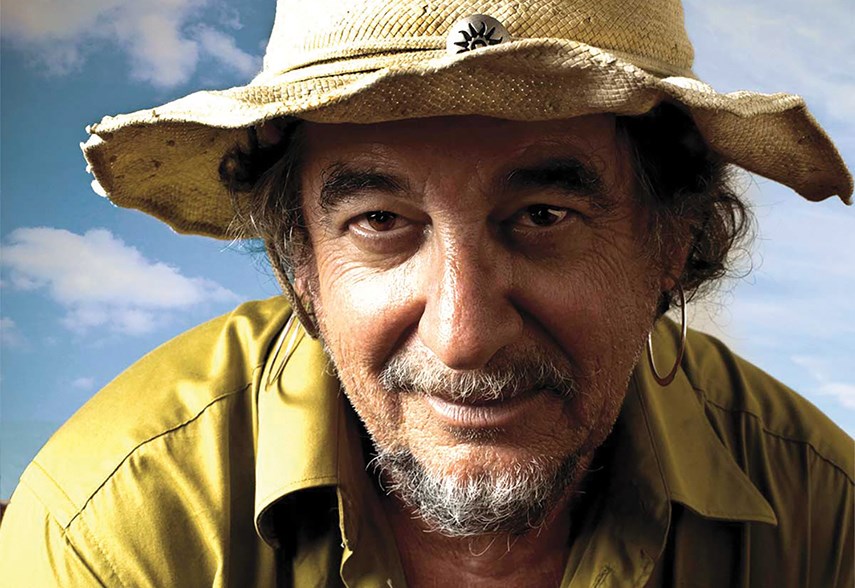Greg Brown, BlueShore Financial Centre for the Performing Arts at Capilano University, Thursday, June 27, 8 p.m Tickets: $38/$36. For more information and schedule visit coastaljazz.ca.
Greg Brown is on his way into town. And on his way out.
“I’m on my last go-round so if they want to hear me, now would be the time.”
Brown’s speaking voice is just like his singing voice; full of power and the wit inherited from generations of storytellers and contoured by decades of singing and cigarettes.
He’s got a handful of gigs over June and July and then he plans to walk away from the road and head back to Iowa where he lives with his wife, singer/songwriter Iris DeMent.
“I’ve toured enough,” Brown says. “Anything you do for 40 years . . .”
As a kid, Brown thought he might be better off as a teacher or a forester, “something more normal.”
Instead, he put his life into music, singing about the twang of banjos after midnight, driving snowblind in the spring, love, bozos, and being warm as a July tomato.
He grew up in a small town in the Hacklebarney section of southern Iowa, learning music from down south, up the mountains, and the heavens.
“Most of the people who settled there were from Appalachia. That was coal mine country and railroad country. A lot of them came up from there and they brought that music: old hill music and fiddle tunes,” he recalls.
And there was gospel music.
“There was a lot of stomping and crying and falling down and speaking in tongues,” he says. “I just loved all that stuff when I was kid. I’m glad I got out of it when I hit puberty. It might’ve messed me up.”
His grandmother played the pump organ. His mother, an English teacher, would recite “The Highwayman,” telling her boy the rhythmic tale of crime and doomed love under a moon that looked like a “ghostly galleon tossed upon cloudy seas.”
“I loved poetry and music on the get-go,” he says. “I started writing poems when I popped out.”
The hard part wasn’t singing or playing, it was just making enough money to sing and play.
“I would play for a while and then I’d get broke. And then I’d get a job and then I’d save a little money and then I’d go play . . . that went on for about 12, 15 years, I don’t know.”
He worked in a library, an insane asylum, drove a truck, and toiled in a golf bag factory. “Back then it was pretty easy to get a job that would pay enough to live on.”
It was doing Prairie Home Companion that helped him “get around the country and start touring,” he says.
He also got a little notoriety in 2010 for contributing a tune to the Crazy Heart soundtrack.
This “really nice fellow” named Jeff Bridges was coming to his gigs, he noticed.
“He was doing research for his Crazy Heart role, which didn’t make me feel too good: An old drunken singer. I didn’t want to be a role model for that necessarily,” Brown says.
But when he heard they were looking for a tune, he pulled “Brand New Angel” out of the air.
“I wrote that for an old, blind fiddle player, long time ago,” he says. “I thought for sure, ‘Well, they’re not going to want this one.’”
Asked if the movie helped his career, Brown laughs.
“If it did, I didn’t notice.”
Bridges ended up singing Brown’s tune, as well as winning an Academy Award for best actor.
“To tell you the truth, that movie I thought was pretty good. But the next one, True Grit, in which my wife had a song . . . I thought that was a really great movie.”
When Brown started in the music business he’d sometimes take his records right into a radio station and see if he could talk the DJ into putting him on the air.
“I still sell some CDs to old people,” he says. But he also knows the business he grew up on has transformed. “All I know is it’s all on the internet and I just wish everybody good luck.”
His show at Capilano University will probably include some new songs, some old songs, and maybe covers of Merle Haggard, Bob Dylan and Woody Guthrie.
The one ballad he’s positive he won’t play, however, is his protest song: “Trump Can’t Have That.”
“It’s gotten to where I don’t like to hear his goddamn name, even coming out of my mouth.”
Political songs can be important, he says. “But I’m not really good at writing those. I think the Trump song is a pretty good example of that,” he laughs.
While Brown is leaving the road, he’s not leaving music.
“I intend to keep writing and I think I’ll even make records,” he says. “That’s kind of an absurd activity; but I like absurd activities.”



